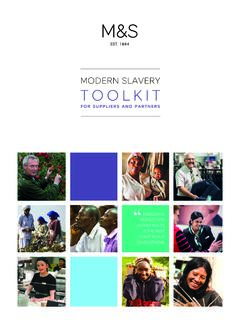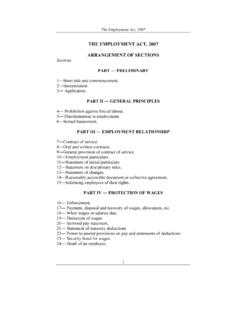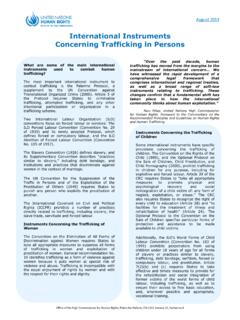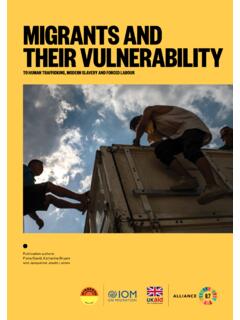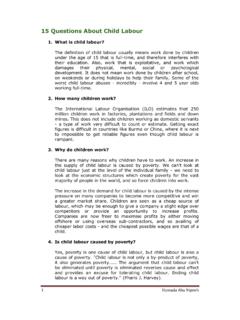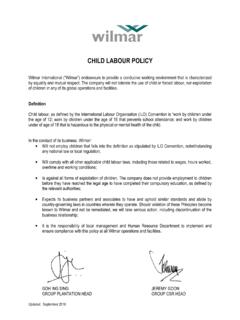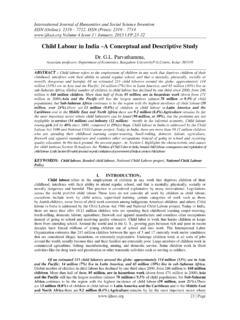Transcription of Labour law in Pakistan - RIAA Barker Gillette
1 RIAA Barker Gillette ( Pakistan ) is a partnership registered in Pakistan , under registration number 95/0714, with its registered office at D-67/1, Block 4, Clifton, Karachi-75600, Pakistan . The term partner is used to refer to a member of the firm. A list of members of the firm is available in our offices. The firm is registered with the Registrar of Firms for Karachi, Pakistan . RIAA Barker Gillette is a trading name for distinct legal entities in different jurisdictions. All references to RIAA Barker Gillette ( Pakistan ) mean RIAA Barker Gillette ( Pakistan ). Labour law in Pakistan is broad and contains several ordinances, acts, rules and regulations and all other statutes relating to industrial, commercial and Labour establishments. These different laws give authentic guide to the Employers, the Employees, the Trade Unions and the concerned Agencies to realize their respective responsibilities and to become aware of their prescribed legal rights to be asserted.
2 These laws compliment in smooth running of the business with regard to matters relating to employers and employees in order to achieve the target of higher productively, reasonable profits, better wages and reduction in unjust practices or discrimination. Social and economic well-being of the people is one of the principal objectives of the government. Labour Policy, like policies in other fields, should also aim in attaining the objectives in a manner best suited to the resources of the country and the state of economy. There is an equally genuine requirement to create among workers and employers, a better awareness of their obligations to the national objectives stated above. At the same time, the Government recognizes that workers and employers must enjoy reasonable benefits as can be sustained by the economy without suffering set-backs.
3 After independence Pakistan inherited different legislations from British India which includes Trade Union Act 1926, Industrial Employment (Standing Orders) Act 1946, Industrial Dispute Act 1926 and factories Act 1934. These laws provided the basis for Labour laws and policy making in the country and were progressive as they allowed trade union activities in all sectors and the workers had the rights of collective bargaining and even strike. The Trade Union (Amendment) Ordinance 1960, containing provisions of the earlier Act, was promulgated in 1960 and it established the principle of compulsory recognition of trade unions by employers. It also included the unfair Labour practices, both on the part of Employers and Employees.
4 The Industrial Dispute Act 1926 was replaced by Industrial Dispute Ordinance 1959, in the Ayub regime, changed the system, more enterprises were included in the public utility definition strikes were eventually banned. The compulsory adjudication system made workers going from one court to another court for years in the quest for justice. During Yahaya Khan Regime, the second military dictator, Labour legislation was rewritten with emphasis on two points: the trade union movement should remain factory/plant based and delinked from the party politics. The martial law regimes, just after the first decade of independence, on the one had did bring increased industrialization and jobs but on the other hand, also brought retrogressive Labour laws and the system of repression which still continues.
5 The Constitution of Pakistan contains a range of provisions with regards to Labour rights found in Part II: Fundamental Rights and Principles of Policy. Article 11 of the Constitution prohibits all forms of slavery, forced Labour and child Labour ; Article 17 provides for a fundamental right to exercise the freedom of association and the right to form unions; Article 18 proscribes the right of its citizens to enter upon any lawful profession or occupation and to conduct any lawful trade or business; Article 25 lays down the right to equality before the law and prohibition of discrimination on the grounds of sex alone; Article 37(e) makes provision for securing just and humane conditions of work, ensuring that children and women are not employed in vocations unsuited to their age or sex, and for maternity benefits for women in employment.
6 Legislation has its basis from the law of contract (the law of master and servant ) and industrial relations regulations are considered departure from common law. Since creation of Pakistan , five Labour policies have been announced by the governments in the year 1955, 1959, 1969, 1972 and 2002. All these polices basically laid-down the parameters for the growth of trade unionism; the protection of Labour law in Pakistan Overview {SMJ/B0966368-7} 2 workers rights; the settlement of industrial disputes and redressal of worker grievances. Between 2000 to 2002, 20 laws consolidated into following 6 draft laws: Industrial Relations Ordinance Conditions of Employment Ordinance Payment of Wages Ordinance Occupational Safety & Health Ordinance Labour Welfare & Social Security Ordinance Human Resources Development & Control of Employment Ordinance After 2002, no Labour Policy was introduced although a number of developments took place in the intervening period, which would have necessitated the same.
7 In this scenario the Prime Minister of Pakistan in his first speech emphasized the need to address the Labour issues and announced the lifting of ban on trade unionism, repeal of Industrial Relations Ordinance, 2002, Removal from Service (Special Powers) Ordinance, 2000 and other anti- Labour laws. In pursuance of Prime Minister s directions, a new Labour Policy of the Government is placed. The new technologies demanded a high level of professional competence along with specialized skills. Considering the changes requirements of the time, it was imperative re-establishing technical training and human resource development programmes to train manpower in multiple trades. To have a productive consultation with the stakeholder, Pakistan Tripartite Labour Conference under the Chairmanship of the Prime Minister was held on 16th February, 2009 after about eight years, which culminated in useful recommendations for legislative, institutional and administrative reforms to meet the emerging challenges of the time.
8 These recommendations were further discussed in Provincial Tripartite Committees, and all these recommendations are the basis of this new Labour policy. The objective before the government is that the new Labour Policy should ensure a harmonious working relationship between workers and employers for improving performance and efficiency of the industry. In 2010, subjects of Labour and employment devolved to Provinces under the 18th Amendment to the Constitution of Pakistan , as a result of which the Federal Labour laws made applicable on Provinces under Article 270AA(6) of the Constitution of Pakistan until replaced, amended or repealed by Provinces. Labour Policy 2010 announced on 1 May was noted by analysts as grossly lacking on all grounds. It fell short of a policy document, lacking in research and insights on ground realities and ignorant of the government s own past and current initiatives.
9 Constitutional experts raised the question of its validity after the abolition of the concurrent list under the 18th Amendment which rendered Labour a provincial subject. Labour Policy 2010 was silent on agricultural workers rights of unionization and collective bargaining. It only accedes to cover agricultural workers in mechanized farms for compensation on death or injury under the Workmen s Compensation Act 1923. On crucial issues of child Labour and forced Labour , the policy made cursory remakes. The policy failed to outline strategic actions to address gender disparity in the work force and in workplace. Rampant violation of ILO Convention on equal remuneration for equal work and low participation of female workers is indicative of anti-women work environment.
10 The policy talked of Smart Cards for registration of a minute section of workers already registered under Social Security and EOBI, and of payment of wages via banks, ignoring the fact that less than 15 per cent of the country s population has access to the banking facilities. The Labour Policy 2010 aimed to merge and downsize Labour laws in to five core laws. The writers of the policy missed that in 2001 the Labour and Manpower Division shared six drafts of consolidated proposed laws with the stakeholders. The drafts had included the Industrial Relations Ordinance, the Wages Ordinance, Conditions of Employment Ordinance, Occupational Health and Safety Ordinance, the Human Resource Development Ordinance, and the Labour Welfare and Social Security, Ordinance. Sindh is still in the process of making proposals for reforming Labour law while Punjab has enacted an industrial relations act, which allegedly has many anti- Labour provisions.
